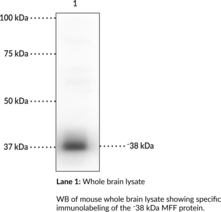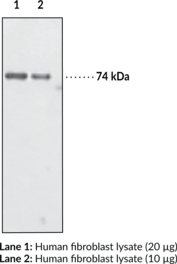Description
Mitochondrial fission factor (MFF) is a tail-anchored membrane protein with roles in mitochondrial and peroxisomal fission.{55234,59142} It is localized to the outer membrane of mitochondria, as well as the membrane-restricted regions of elongated peroxisomes. It is composed of a cytoplasmic N-terminus that functions as a receptor for the GTPases dynamin-related protein 1 (DRP1) and dynamin-like protein 1 (DLP1), a central coiled-coil domain, and a C-terminal transmembrane domain.{59144} siRNA knockdown of MFF inhibits DRP1 recruitment and mitochondrial fission induced by loss of mitochondrial membrane potential and delays cytochrome c release from mitochondria and apoptotic progression in vitro.{55234,59144} MicroRNA knockdown of MFF inhibits norepinephrine-induced hypertrophy and mitochondrial fission in isolated neonatal rat ventricular cells.{59144} MFF is overexpressed in various cancer cells and knockdown of MFF reduces tumor volume in a PC3 mouse xenograft model.{59143} Cayman’s Mitochondrial Fission Factor Polyclonal Antibody can be used for immunohistochemistry (IHC) and Western blot (WB) applications. The antibody recognizes MFF at approximately 38 kDa from human, bovine, and mouse samples.
Synonyms: Chromosome Open Reading Frame 33|MFF
Immunogen: Recombinant human MFF
Formulation: 100 µl of polyclonal antibody neat serum
Isotype:
Applications: IHC, WB
Origin:
Stability: 365 days
Application|Immunohistochemistry||Application|Western Blot||Product Type|Antibodies|Polyclonal Antibodies||Research Area|Cancer||Research Area|Cardiovascular System|Heart|Myocardial Hypertrophy||Research Area|Cell Biology|Cell Death|Apoptosis||Research Area|Cell Biology|Endomembrane System & Vesicular Trafficking||Research Area|Cell Biology|Mitochondrial Biology


